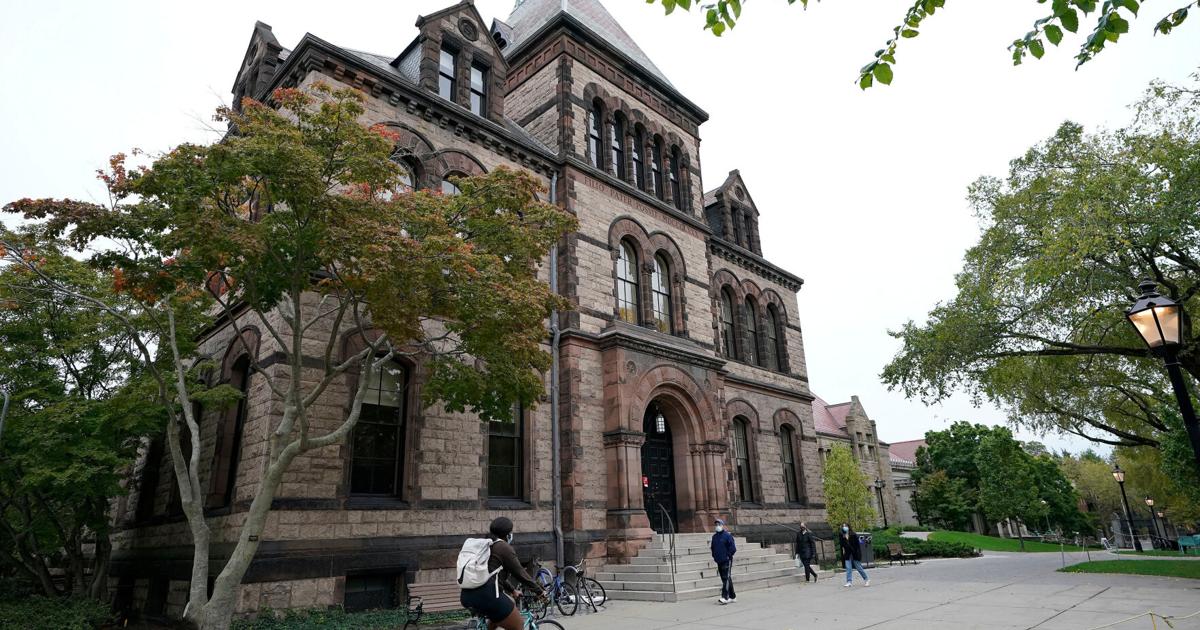WASHINGTON — The White House is asking nine major universities to commit to President Donald Trump’s political priorities in exchange for more favorable access to federal funding.
A document sent to the universities encourages them to adopt the White House’s vision for America’s campuses, with commitments to accept the government’s priorities on admissions, women’s sports, free speech, student discipline, and college affordability, among other topics.
Signing on would give universities “multiple positive benefits,” including “substantial and meaningful federal grants” and “increased overhead payments where feasible,” according to a letter sent alongside the compact. The letter calls it a proactive effort as the administration continues to investigate alleged civil rights violations at U.S. campuses.
### The Compact for Academic Excellence in Higher Education
Called the “Compact for Academic Excellence in Higher Education,” the agreement asks universities to accept the government’s definition of gender and apply it to campus bathrooms, locker rooms, and women’s sports teams. It requests that colleges stop considering race, gender, and a wide range of student demographics in the admissions process and require undergraduate applicants to take the SAT or ACT.
The 10-page proposed agreement was sent Wednesday to some of the most selective public and private universities: Vanderbilt, the University of Pennsylvania, Dartmouth College, the University of Southern California, the Massachusetts Institute of Technology, the University of Texas, the University of Arizona, Brown University, and the University of Virginia.
It was not clear how these schools were selected or why. The nine universities could become “initial signatories” and are being invited to provide feedback before the language is finalized. A decision is requested by November 21.
### White House Takes a New, Incentive-Based Approach
The memo represents a shift in strategy as the administration offers a reward — not just punishment — as an incentive for adopting Trump’s political agenda on campuses. Many of the demands mirror those made by the administration when it cut billions of dollars in federal funding for Harvard, Columbia, and others accused of liberal bias.
A federal judge overturned cuts at Harvard in September, ruling that the government had overstepped its authority.
Several universities said they were reviewing the compact and declined to comment.
A statement from the University of Virginia said there was no indication why it was chosen. The university’s interim president assembled a group of administrators on Thursday to review the letter.
Leaders of the Texas system expressed enthusiasm about the initiative. “We are honored that the Austin campus was chosen to be part of the compact and its potential funding advantages,” said Kevin Eltife, chair of the Board of Regents. “Today we welcome the new opportunity presented to us and look forward to working with the Trump Administration on it.”
### California Pushes Back
California Governor Gavin Newsom said universities in his state that sign the compact will lose access to state funding, including Cal Grants, a $2.8 billion student financial aid program. In an all-caps statement, Newsom declared:
> “California will not bankroll schools that sell out their students, professors, researchers, and surrender academic freedom.”
### Enrollment and Tuition Restrictions
Under the compact, international enrollment would be capped at 15% of a college’s undergraduate student body, with no more than 5% coming from a single country. According to federal data, the universities invited to the compact appear to be within this 15% threshold, although Dartmouth and USC are close at 14%.
While most other U.S. universities also fall within the 15% cap, about 120 exceed it, including Columbia University, Emory University, and Boston University.
### Promoting Conservative Viewpoints on Campus
Some of the most sweeping commitments aim to promote conservative viewpoints. Universities would have to ensure their campuses are a “vibrant marketplace of ideas” where no single ideology dominates.
Campuses would be required to evaluate views among students and faculty to ensure every department reflects a diverse mix of perspectives. To achieve this, the compact suggests steps such as “transforming or abolishing institutional units that purposefully punish, belittle, and even spark violence against conservative ideas.”
Additionally, campuses must adopt policies to counter the type of protests that disrupted many U.S. campuses amid last year’s Israel-Hamas war. The compact calls for commitments to prevent disruptions to classes or campus libraries and to ensure demonstrators do not heckle other students.
### Tuition Freeze and Support for “Hard Science” Programs
Campus signatories would be required to freeze tuition for U.S. students for five years. Furthermore, universities with endowments exceeding $2 million per undergraduate could not charge tuition at all for students pursuing “hard science” programs.
### Critics Warn of Threats to Free Speech and Academic Freedom
Ted Mitchell, president of the American Council on Education, urged universities to reject the deal, saying it violates campus independence and undermines free speech.
> “It’s not worth the compromises that they would have to make,” Mitchell said. “This is a Faustian bargain.”
The compact has also drawn criticism from free speech groups, faculty associations, and prominent figures such as Larry Summers, a former Treasury secretary and Harvard president.
Summers acknowledged that elite universities have lost their way but cautioned that the compact is like trying to
> “fix a watch with a hammer — ill conceived and counterproductive.”
He added, “The backlash against its crudity will likely set back necessary reform efforts.”
### Enforcement and Consequences
The terms of the deal would be enforced by the Justice Department. Violators would lose access to the compact’s benefits for no less than one year, with repeat offenses extending the penalty to two years.
The compact notes:
> “Institutions of higher education are free to develop models and values other than those below if the institution elects to forego federal benefits.”
—
As this initiative unfolds, the national debate over academic freedom, diversity, and federal involvement in higher education intensifies. Universities face challenging decisions balancing autonomy with the potential benefits of federal funding under the new White House compact.
https://www.phillytrib.com/news/trump-asks-9-colleges-to-commit-to-his-political-agenda-and-get-favorable-access-to/article_bf74a687-0bfa-4baa-bbc8-0460ac1256e9.html
